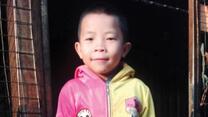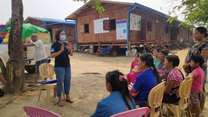In Northern Shan State, Myanmar, Dr Aung Ko Myat is a medical team leader working for Karuna Mission Social Solidarity (KMSS), a local pastoral organisation supported by the International Rescue Committee (IRC). A local man from Northern State and part of the community he serves, Dr Aung is dedicated to helping others in his community. He works around the clock to provide services to communities who have been cut off from healthcare since the conflict in Myanmar escalated.
Years of longstanding conflict among different armed groups in Myanmar has meant that the local population from Northern Shan State live in temporary displacement camps, having been driven from their homes as violence increased. Some families have lived in camps for internally displaced people for many years and are fully reliant on humanitarian services for healthcare. Thanks to support from the European Union, the International Rescue Committee has been able to partner with KMSS to provide basic healthcare to communities that no longer have access to services such as maternal and child healthcare.
Most people who Dr Aung Ko Myat serves travel to the health clinic as a last resort. Indeed, due to long journeys or financial problems, many Burmese families cannot afford to purchase medicine. “Right now,” Dr Aung explains, “all civilians in Myanmar avoid coming to a health clinic or hospital when they feel that something is wrong with their health. They have poor health knowledge and, as a result, only come to the clinic when their illness has advanced.”
Reaching a hospital early is critical when it comes to the most common concern among the communities served by IRC - malnutrition. Being part of the local community means that Dr Aung looks to the people he serves for courage. “When we opened the clinic, the community appreciated it and now depends on their services. I am proud to provide them with emergency services as well as primary care and support them financially if they are hospitalised. In doing this, we can save the lives of our clients. Our services are essential to them and by helping them on a daily basis, I also get strength and courage,” shares Dr Aung Ko when asked how he finds motivation on difficult days.
Thanks to local Health workers as Dr Aung Ko and partner organizations, the IRC and the EU can provide support for basic needs and humanitarian relief in Myanmar, a cyclone-prone country. The IRC has therefore expanded its work to reach out to communities affected by conflict and disaster in even the most remote parts of the country.
The International Rescue Committee partners with the European Union to provide life-saving support to people caught in conflict and disasters around the world. Our work funded by the EU enables people to survive, recover and rebuild their lives.


